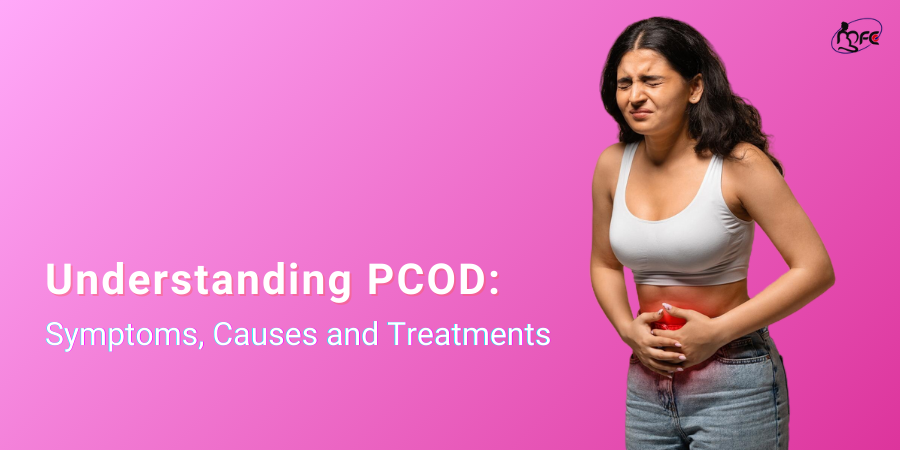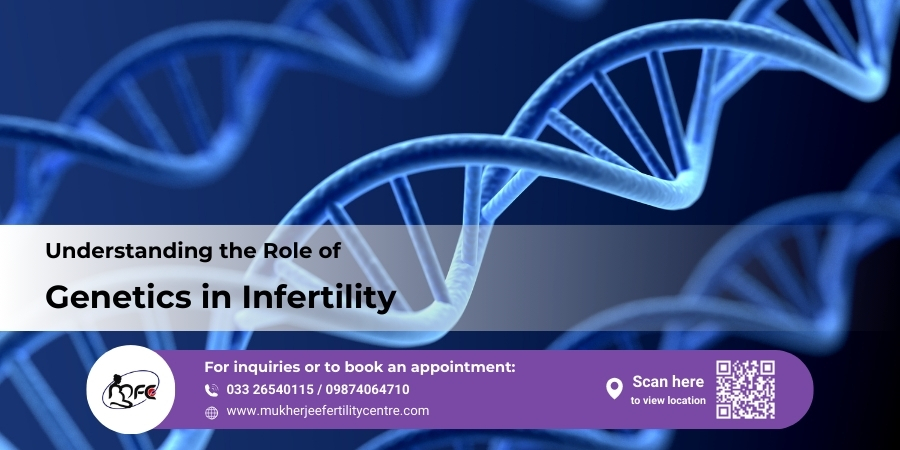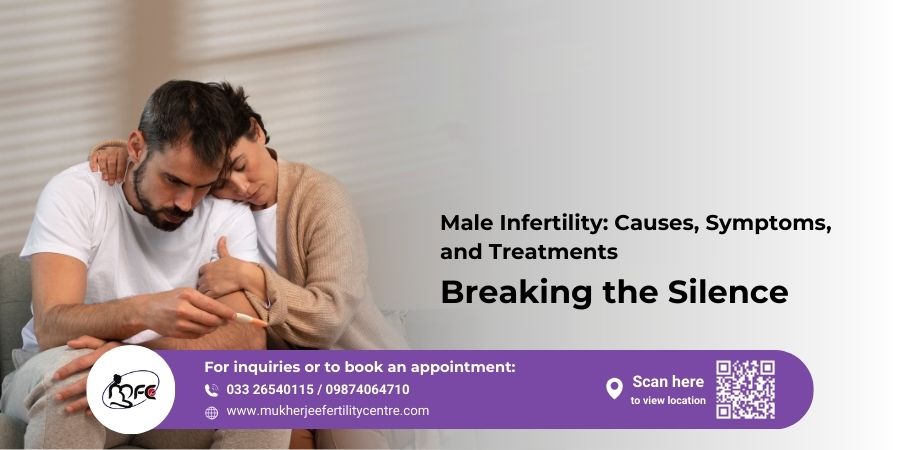
Understanding PCOD: Symptoms, Causes and Treatments
By MFC on 24,Jun 2024
Polycystic Ovary Disease (PCOD), also known as Polycystic Ovary Syndrome (PCOS), is a common hormonal disorder affecting women of reproductive age. This article aims to provide comprehensive information on PCOD, including its symptoms, treatment options, and frequently asked questions. Dr. Shiuli Mukherjee, a renowned fertility doctor at Mukherjee Fertility Centre (MFC) and one of the best gynecologists in Kolkata, offers her expert insights on this topic.
What is PCOD?
PCOD, short for Polycystic Ovary Disease, involves the formation of multiple small cysts in the ovaries. These cysts result from hormonal imbalances that interfere with the normal ovulation process. While PCOD and PCOS are often used interchangeably, there are subtle differences. PCOD primarily refers to the ovarian cysts, whereas PCOS is a broader term encompassing a range of symptoms and metabolic issues.
Symptoms of PCOD
Recognizing the symptoms of PCOD is crucial for early diagnosis and effective treatment. Here are the common signs:
- Irregular Periods: One of the first signs of PCOD is irregular menstrual cycles. Women may experience infrequent, prolonged, or completely missed periods.
- Excess Androgen: Elevated levels of male hormones can lead to physical signs such as hirsutism (excessive hair growth on the face and body), acne, and male-pattern baldness.
- Polycystic Ovaries: Ultrasound examinations often reveal enlarged ovaries containing numerous small cysts.
- Weight Gain: Many women with PCOD struggle with weight gain and difficulty losing weight, which can exacerbate other symptoms.
- Infertility: Hormonal imbalances can lead to anovulation (lack of ovulation), making it difficult for women to conceive.
- Skin Issues: Skin tags, darkened skin patches, and severe acne are common symptoms associated with PCOD.
- Mood Swings and Depression: Hormonal fluctuations can significantly impact mood, leading to depression, anxiety, and mood swings.
- Pain: PCOD symptoms pain includes pelvic pain, which can be chronic or occur during periods.
Causes of PCOD
The exact cause of PCOD is not fully understood, but several factors contribute to its development:
- Genetics: Family history plays a significant role. Women with a mother or sister with PCOD are more likely to develop the condition.
- Insulin Resistance: Many women with PCOD have insulin resistance, which can lead to elevated insulin levels and increased androgen production.
- Hormonal Imbalances: Abnormal levels of hormones like insulin, androgens, and luteinizing hormone (LH) contribute to the development of PCOD.
PCOD Problem Treatment Options
PCOD is a chronic condition, but it can be managed effectively with the right treatment approach. Here's how:
- Lifestyle Modifications:
- Diet: Adopting a balanced diet rich in whole foods, lean proteins, and fiber can help manage weight and insulin levels.
- Exercise: Regular physical activity can improve insulin sensitivity and aid in weight management.
- Medications:
- Birth Control Pills: Oral contraceptives regulate menstrual cycles, reduce androgen levels, and control acne and excessive hair growth.
- Anti-Androgens: Medications like spironolactone can reduce androgen levels, addressing symptoms like hirsutism and acne.
- Metformin: This diabetes medication improves insulin resistance and can help with weight management and menstrual regularity.
- Fertility Treatments:
For women facing infertility due to PCOD, fertility treatments like ovulation induction with medications such as clomiphene citrate or letrozole, and assisted reproductive technologies like IVF, can be effective.
- Surgical Options:
In severe cases, laparoscopic ovarian drilling (LOD) can trigger ovulation by reducing androgen-producing tissue in the ovaries.
- Alternative Therapies:
Some women find relief through acupuncture, herbal supplements, and stress-reducing techniques like yoga and meditation.
PCOD vs PCOS:
PCOD and PCOS are often used interchangeably, but they have slight differences:
- PCOD: Refers specifically to the presence of multiple cysts in the ovaries.
- PCOS: A broader term that includes a variety of symptoms like hormonal imbalances, metabolic issues, and the presence of ovarian cysts.
PCOS Treatment for Unmarried Women
Unmarried women with PCOD face unique challenges and concerns. The treatment approach focuses on managing symptoms and preventing complications:
- Menstrual Regulation: Hormonal contraceptives can help regulate menstrual cycles and reduce symptoms.
- Skin and Hair Issues: Topical treatments and medications can address acne and excessive hair growth.
- Weight Management: Diet and exercise play a critical role in managing PCOD symptoms.
How to Cure PCOS Permanently
While there is no permanent cure for PCOS, effective management can alleviate symptoms and reduce the risk of complications. A combination of lifestyle changes, medications, and medical treatments tailored to individual needs is the best approach.
Dr. Shiuli Mukherjee: Expert Care at Mukherjee Fertility Centre
Dr. Shiuli Mukherjee, a renowned fertility doctor at Mukherjee Fertility Centre, offers comprehensive care for women with PCOD. Her expertise and compassionate approach make her the best gynecologist in Kolkata. At MFC, the focus is on personalized treatment plans that address the unique needs of each patient, ensuring optimal outcomes.
Frequently Asked Questions
- Can PCOD affect fertility?
- What are the long-term risks associated with PCOD?
- Can weight loss improve PCOD symptoms?
- Is PCOD hereditary?
- Can PCOD be diagnosed with a blood test?
- Are there natural remedies for PCOD?
- What is the role of insulin in PCOD?
Yes, PCOD can affect fertility by causing irregular ovulation or anovulation (absence of ovulation). However, with appropriate treatment, many women with PCOD can conceive successfully.
Women with PCOD are at an increased risk of developing type 2 diabetes, cardiovascular disease, and endometrial cancer. Managing symptoms and maintaining a healthy lifestyle can help mitigate these risks.
Yes, even a modest weight loss of 5-10% of body weight can significantly improve PCOD symptoms, including menstrual regularity and insulin sensitivity.
PCOD has a genetic component, meaning it can run in families. If you have a family history of PCOD, you may be at a higher risk of developing the condition.
Blood tests can help diagnose PCOD by measuring hormone levels, including androgens and insulin. An ultrasound may also be used to detect the presence of ovarian cysts.
While lifestyle changes such as diet and exercise are crucial, some natural supplements like inositol and omega-3 fatty acids may help manage symptoms. Always consult with a healthcare provider before starting any supplement.
Insulin resistance is common in women with PCOD, leading to higher insulin levels that can cause weight gain and increased androgen production. Managing insulin levels through diet, exercise, and medication is essential.
Conclusion
PCOD is a complex condition that requires a multifaceted treatment approach. Understanding the symptoms and seeking timely medical intervention can significantly improve the quality of life for women affected by PCOD. Dr. Shiuli Mukherjee and the team at Mukherjee Fertility Centre are dedicated to providing the highest standard of care, helping women manage their symptoms and achieve their fertility goals.
For more information or to schedule a consultation with Dr. Shiuli Mukherjee, please reach out to Mukherjee Fertility Centre at 9874064710 or 033 2654 0115. You can also visit our website at www.mukherjeefertilitycentre.com for more information or to book an appointment online.
Together, we can navigate the challenges of PCOD and work towards a healthier, happier life.









